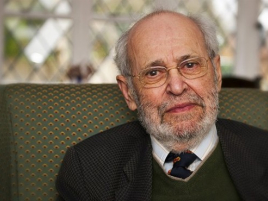Geza Vermes, Scholar of ‘Historical Jesus,’ Dies at 88
By William Yardley | May 17, 2013

Geza Vermes, a religious scholar who argued that Jesus as a historical figure could be understood only through the Jewish tradition from which he emerged, and who helped expand that understanding through his widely read English translations of the Dead Sea Scrolls, died on May 8 in Oxford, England. He was 88.
His death was confirmed by David Ariel, the president of the Oxford Center for Hebrew and Jewish Studies, where Dr. Vermes was most recently an honorary fellow.
Dr. Vermes, born in Hungary to Jewish parents who converted to Christianity when he was 6, was among many scholars after World War II who sought to reveal a “historical Jesus” by painting an objective portrait of the man who grew up in Nazareth about 2,000 years ago and emerged as a religious leader when he was in his 30s.
Drawing on new archaeological evidence — particularly the scrolls, which were discovered by an Arab shepherd in a cave northwest of the Dead Sea in 1947 — historians of many stripes agreed on a basic sketch of Jesus, but their religious biases sometimes colored details.
“You can cut out the Jewish part — that is the traditional Christian path,” Dr. Vermes said in a 1994 interview with Herschel Shanks, the editor of Biblical Archaeology Review. “But if you are more demanding and want to go back to the sources, you will realize that Jesus stood before Christianity.”

The entrance of the cave in Qumran where the scrolls were found.
The scrolls, written over several hundred years before, during and after Jesus lived, offered new insight into religious, cultural and political life at the time. Dr. Vermes became one of the scrolls’ essential translators and a vocal advocate for their broad dissemination. His 1962 book, “The Dead Sea Scrolls in English,” has been updated and reissued multiple times and is regarded as the most widely read version of the scrolls. It is often used as a course text.
Dr. Vermes had long been frustrated that only a handful of scholars had direct access to the scrolls, and he eventually made his frustrations public. In 1977, he said that their handling was “likely to become the academic scandal par excellence of the 20th century.” More than a decade passed, but the scrolls eventually became more easily accessible in their original form and through photographs.

A scholar studying one of the Dead Sea Scrolls.
Read more: http://www.nytimes.com/2013/05/17/world/europe/geza-vermes-dead-sea-scrolls-scholar-dies-at-88.html?emc=tnt&tntemail0=y














